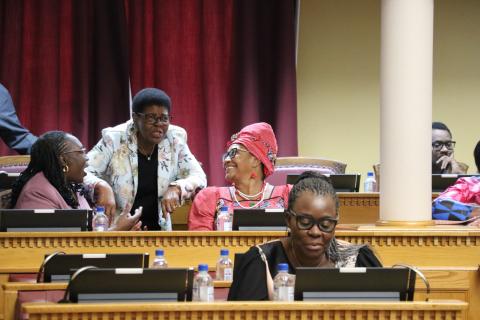Women’s representation in parliament worldwide has increased slightly from 26.5% to 26.9% this year.
These statistics were collected after over 60 parliaments in 52 countries held their parliamentary elections in 2023.
The sub-Saharan Africa region accounts for the third highest, at over 27%.
According to the Inter-Parliamentary Union (IPU), electoral quotas have been instrumental in improving women’s representation, with over 28% of women elected having come from electoral gender quota systems.
Statistics further reveal that 23% of women were elected as Speakers of Parliament around the world.
The statistics were revealed in a report during the meeting of the Forum of Women Parliamentarians at the 148th IPU Assembly being held in Geneva, Switzerland.
Namibia prides itself on being among the countries ranked highest in terms of women’s representation in parliament.
The Speaker of the National Assembly, Professor Peter Katjavivi, recently announced that the lower chamber of Namibia, which is the National Assembly, has reached 50% female representation from 46% last year.
Women’s representation in the National Council, however, has remained low, at just over 14%.
Professor Katjavivi noted on the sidelines of the assembly that efforts should be made to make sure that the status quo is sustained.
The Vice Chairperson of the National Council, who is also part of the Namibian delegation, Victoria Kauma, echoed similar sentiments, further imploring that there is a need to create awareness among women about the importance of participating in politics.
Another MP, Charmaine Tjirare, who is equally impressed with the Namibian parliament’s latest achievements, called for the introduction of an electoral gender quota system.
According to the IPU, several impediments have been contributing to slow progress.
These include women being targeted with violence and disinformation, resulting in their withdrawing from participating in politics.
To avoid the status quo, key recommendations that were made at a previous engagement of the Forum of Women Parliamentarians included peer-to-peer support for building resilience among politicians and the need for unity across party lines and borders.
Professor Katjavivi is leading a delegation of Namibian lawmakers to the 148th IPU Assembly, which includes Henny Seibeb, Charmaine Tjirare, and Nono Katjingisiua.
The National Council is represented by its Vice Chairperson, Victoria Kauma, and fellow lawmakers, Emma Muteka, Leonard Shikulo, and Sebastian !Gobs.



Leave a Reply